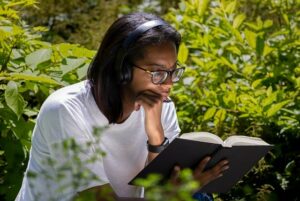
Each year, since 1967, UNESCO has taken the 8th September as a special day to remind the world ‘of the importance of literacy as a matter of dignity and human rights’. World Literacy Day emphasises the power of literacy and creates awareness to advance the global agenda towards a more literate and sustainable society.
According to UNESCO, education is a fundamental human right and a key pillar of society and defines literacy as a life-long process, using reading, writing and counting skills which will enable people to access information throughout their lives, in any form presented and, presumably, as the information dissemination process changes. ‘Literacy is a continuum of learning and proficiency in reading, writing and using numbers throughout life’.
In terms of numbers, UNESCO point to some success –we now say that 86% of the world’s population know how to read and write. However, 765million adults still cannot , two-thirds of them women and 250 million children in the world are failing to acquire literacy skills. As an integral part of the UN, UNESCO acknowledges the duty to provide universal access to literacy learning, but the difficulty is that locally, governments and organisations hold to themselves the right to determine what information is accessed, by whom, and for what purpose.
In what we laughingly call the developed world, most children go to school, learn to read and write and in theory can therefore learn about their position in their world, where their world fits into the wider world, and participate as citizens. Nevertheless, for various reasons many children do not fulfil their potential. For adults, too, as literacy changes to, for example, information on line, many adults are left out of the loop.
Literacy is a very powerful tool and as such must be provided to all, not just administered to sectors of the community for particular social or political reasons. Everybody must have the human right to access information. Because literacy empowers and liberates people, it may be seen as threatening to governments and to groups who believe that the world works better when the people in it have little power.
Inevitably, the problem is not with the ideal, the global aspiration for universal literacy and access to education, the problem is frequently at the local level – at the point at which individuals feel threatened that change will damage their lives in some way. Communities, local governments, families, and so on, must be persuaded that literacy will enhance their whole community, not just the elites.
A more sinister aspect to effective communication is the tendency to corrupt truthful messages and manipulate information to achieve a particular end. Looking at this problem, the UN suggest that rather than imposing restrictions, we should promote and protect free and independent media and maximise transparency and access to information. Public participation at all levels should be encouraged
Literacy empowers and liberates people. Beyond its importance as part of the right to education, literacy improves lives by expanding capabilities which in turn reduces poverty, increases participation in the labour market and has positive effects on health and sustainable development. As Soroptimists, we know that women powered by literacy have a positive ripple effect on all aspects of development. They have greater life choices for themselves and an immediate impact on the health and education of their families, particularly the education of girl children.
Concerted effort is needed in policy development and financial investment to safeguard literacy for all, especially those from greater disadvantage. To this end, the Global Alliance for Literacy within the Framework of Lifelong Learning (GAL) was launched in 2016 to advance global literacy efforts and address challenges to promoting literacy around the world.
Girls’ and women’s’ literacy is integral to achieving the aims of the 2030 Agenda. In SDG4 we have an international plan to provide suitable education for anyone, anytime on the road to sustainable development. In this situation where so many people are prevented from achieving literacy and do not have genuine access to the information they need to live productive lives, we must continue through our Programme Action to work towards its implementation.
Mary Hession, SI Dublin


